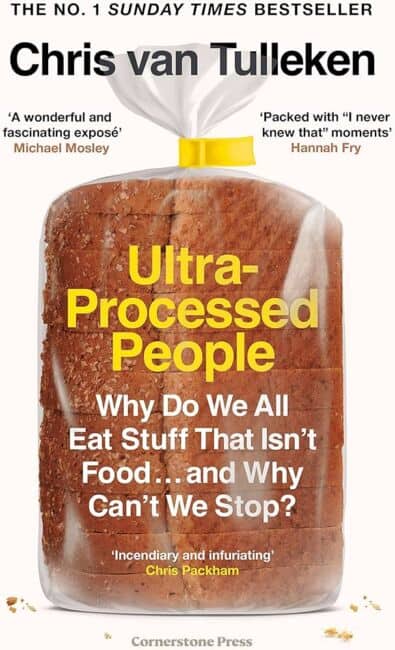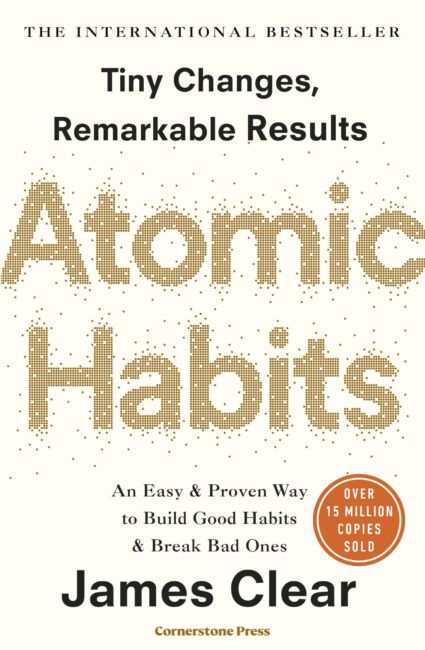Ultra-Processed People
Chris van Tulleken
Chris van Tulleken’s Ultra-Processed People, unlike your average health book, doesn’t scream diet tips or recommend juice cleanses. Instead, it offers a sharp, illuminating look at the global food system, and how much of what we consume isn’t really food at all. Van Tulleken, an infectious diseases doctor and BBC presenter, blends investigative journalism with lived experience to explore the hidden (and not-so-hidden) dangers of ultra-processed foods (UPFs) – the kind of stuff that makes up more than half the average British diet, and increasingly dominates global eating habits.
The book opens with a bold experiment: van Tulleken subjects himself to a diet consisting of 80% ultra-processed food for a month. The idea is to witness (and document) the effects of these seemingly innocuous items on the human body. Spoiler: it’s not pretty. He gains weight, feels lethargic, struggles with mood swings, and suffers from poor sleep. And yet, even knowing all this, he finds it hard to stop eating the stuff. This powerful anecdotal backbone propels the narrative and makes his findings hit home with force.
“This book is going to hurt, exposing the food industry’s underbelly in painstaking, gory, unanaesthetised detail.”
- Adam Leyland, The Grocer
What makes Ultra-Processed People particularly compelling is how it bridges the gap between science and storytelling. Van Tulleken doesn’t talk down to the reader. Instead, he pulls them into a discussion that’s as urgent as it is nuanced. We learn that UPFs aren’t just about convenience – they’re meticulously engineered to override our body’s natural satiety signals, tricking us into eating more, feeling worse, and wanting more still. Think fizzy drinks that mask sugar with coldness and carbonation, or packaged snacks that hit the bliss point with military precision.
“This very readable book also talks a lot about sugar. We have, according to Dr Van Tulleken, a natural aversion to eating excess sugar, but ultra-processed drinks get around this by making them fizzy and serving them ice cold.”
- World Cancer Research Fund
What sets this book apart from other food-science exposés is its deep dive into the intersection of biology, psychology, and corporate capitalism. Van Tulleken isn’t just focused on what UPFs do to our bodies; he’s also interested in what they say about our societies.
He links the rise of UPFs to the decline in home cooking, the allegedly deliberate erosion of food knowledge, and the disproportionate targeting of low-income communities with unhealthy products. It’s no longer enough to label something as unhealthy – van Tulleken wants to know why we still eat it anyway.
One of the most sobering revelations in the book is the extent to which UPFs are linked with not just obesity, but a range of non-communicable diseases: cardiovascular conditions, type 2 diabetes, even depression. He references dozens of peer-reviewed studies, but he never lets the science become alienating. Instead, his style is conversational, often humorous, and always brutally honest. You get the sense he’s learning along with us, reacting with both scientific curiosity and human outrage.
“Generally soft and energy-dense, UPFs are literally addictive. The author also devotes generous space to obesity, the world’s leading dietary disorder.”
- Kirkus Reviews
For anyone who loves narrative nonfiction with teeth, Ultra-Processed People delivers. It’s part memoir, part manifesto, part scientific breakdown – think Michael Pollan crossed with Morgan Spurlock, but with a distinctly British sensibility. While it hasn’t yet been adapted into a film or series, you can easily imagine it: a sort of documentary hybrid of Super Size Me and Black Mirror, illustrating our collective sleepwalk into dietary dependency.
Critics have lauded the book for its clarity and moral urgency, though some readers may find the recurring dietary themes a touch repetitive. Still, it’s a repetition that reinforces rather than grates – after all, the food industry itself thrives on repetition, whether that’s supermarket shelves or addictive marketing cycles. Van Tulleken’s argument is clear: UPFs are not merely unhealthy. They are anti-foods – products designed not to nourish, but to keep us coming back for more.
In a modern world where fast food is the norm and marketing budgets often drown out public health campaigns, Ultra-Processed People feels like an essential read. It’s not just a book about what we eat – it’s about who we are becoming as a society, and whether we’re okay with that transformation.
Other works by Chris van Tulleken
- Operation Ouch! (co-authored with Dr. Xand van Tulleken) – a children’s science series that brings medicine to life with humour and clarity.
- The Doctor Who Gave Up Drugs (BBC documentary) – an exploration of the UK’s over-reliance on pharmaceuticals.
- What Are We Feeding Our Kids? (BBC documentary) – a precursor to this book that offers a visual counterpart to many of the same ideas.
Discover more thought-provoking reads with Victoria Freudenheim
We’re not alone in believing that great books shouldn’t only entertain, but also spark actual reflection on the real world. Ultra-Processed People is a perfect example – as a book that expertly blends science, emotion, and cultural critique to create a powerful argument. If you’re looking to challenge your reading (and perhaps eating) habits, check out our latest reviews of a whole world-breadth of books and get stuck in with thoughtful pieces on our blog.

